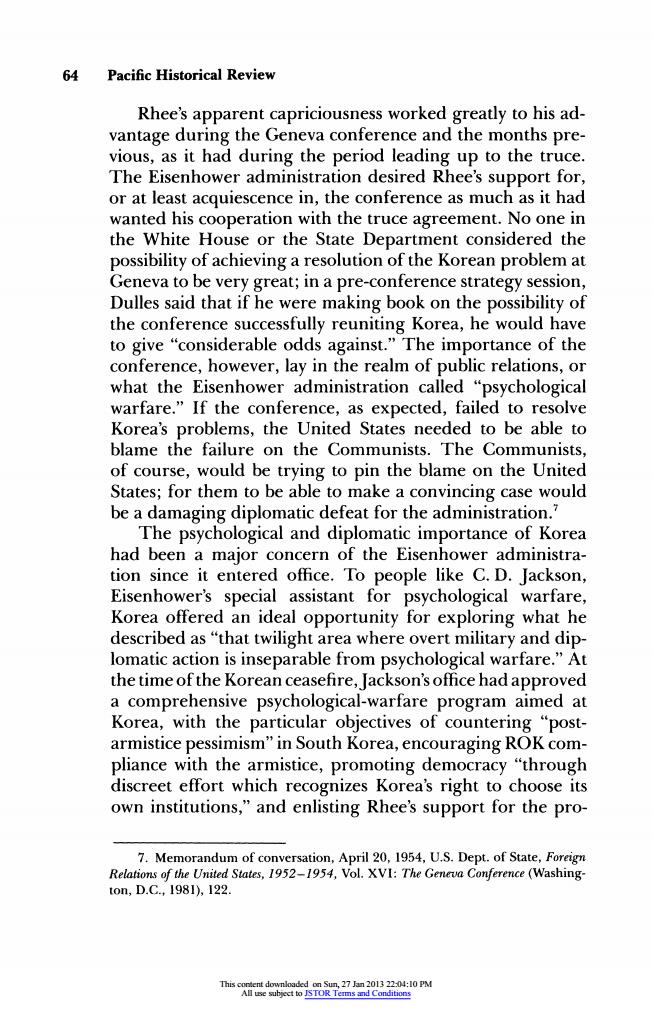正在加载图片...

64 Pacific Historical Review Rhee's apparent capriciousness worked greatly to his ad- vantage during the Geneva conference and the months pre- vious,as it had during the period leading up to the truce. The Eisenhower administration desired Rhee's support for, or at least acquiescence in,the conference as much as it had wanted his cooperation with the truce agreement.No one in the White House or the State Department considered the possibility of achieving a resolution of the Korean problem at Geneva to be very great;in a pre-conference strategy session, Dulles said that if he were making book on the possibility of the conference successfully reuniting Korea,he would have to give "considerable odds against."The importance of the conference,however,lay in the realm of public relations,or what the Eisenhower administration called "psychological warfare."If the conference,as expected,failed to resolve Korea's problems,the United States needed to be able to blame the failure on the Communists.The Communists, of course,would be trying to pin the blame on the United States;for them to be able to make a convincing case would be a damaging diplomatic defeat for the administration.' The psychological and diplomatic importance of Korea had been a major concern of the Eisenhower administra- tion since it entered office.To people like C.D.Jackson, Eisenhower's special assistant for psychological warfare, Korea offered an ideal opportunity for exploring what he described as"that twilight area where overt military and dip- lomatic action is inseparable from psychological warfare."At the time of the Korean ceasefire,Jackson's office had approved a comprehensive psychological-warfare program aimed at Korea,with the particular objectives of countering "post- armistice pessimism"in South Korea,encouraging ROK com- pliance with the armistice,promoting democracy "through discreet effort which recognizes Korea's right to choose its own institutions,and enlisting Rhee's support for the pro- 7.Memorandum of conversation,April 20,1954,U.S.Dept.of State,Foreign Relations of the United States,1952-1954,Vol.XVI:The Geneva Conference (Washing- ton,D.C,1981),122. This content downloaded on Sun,27 Jan 2013 22.04:10 PM All use subpect to JSTOR Terms and Conditions64 Pacific Historical Review Rhee's apparent capriciousness worked greatly to his advantage during the Geneva conference and the months previous, as it had during the period leading up to the truce. The Eisenhower administration desired Rhee's support for, or at least acquiescence in, the conference as much as it had wanted his cooperation with the truce agreement. No one in the White House or the State Department considered the possibility of achieving a resolution of the Korean problem at Geneva to be very great; in a pre-conference strategy session, Dulles said that if he were making book on the possibility of the conference successfully reuniting Korea, he would have to give "considerable odds against." The importance of the conference, however, lay in the realm of public relations, or what the Eisenhower administration called "psychological warfare." If the conference, as expected, failed to resolve Korea's problems, the United States needed to be able to blame the failure on the Communists. The Communists, of course, would be trying to pin the blame on the United States; for them to be able to make a convincing case would be a damaging diplomatic defeat for the administration.7 The psychological and diplomatic importance of Korea had been a major concern of the Eisenhower administration since it entered office. To people like C. D. Jackson, Eisenhower's special assistant for psychological warfare, Korea offered an ideal opportunity for exploring what he described as "that twilight area where overt military and diplomatic action is inseparable from psychological warfare." At the time of the Korean ceasefire,Jackson's office had approved a comprehensive psychological-warfare program aimed at Korea, with the particular objectives of countering "postarmistice pessimism" in South Korea, encouraging ROK compliance with the armistice, promoting democracy "through discreet effort which recognizes Korea's right to choose its own institutions," and enlisting Rhee's support for the pro- 7. Memorandum of conversation, April 20, 1954, U.S. Dept. of State, Foreign Relations of the United States, 1952-1954, Vol. XVI: The Geneva Conference (Washington, D.C., 1981), 122. This content downloaded on Sun, 27 Jan 2013 22:04:10 PM All use subject to JSTOR Terms and Conditions